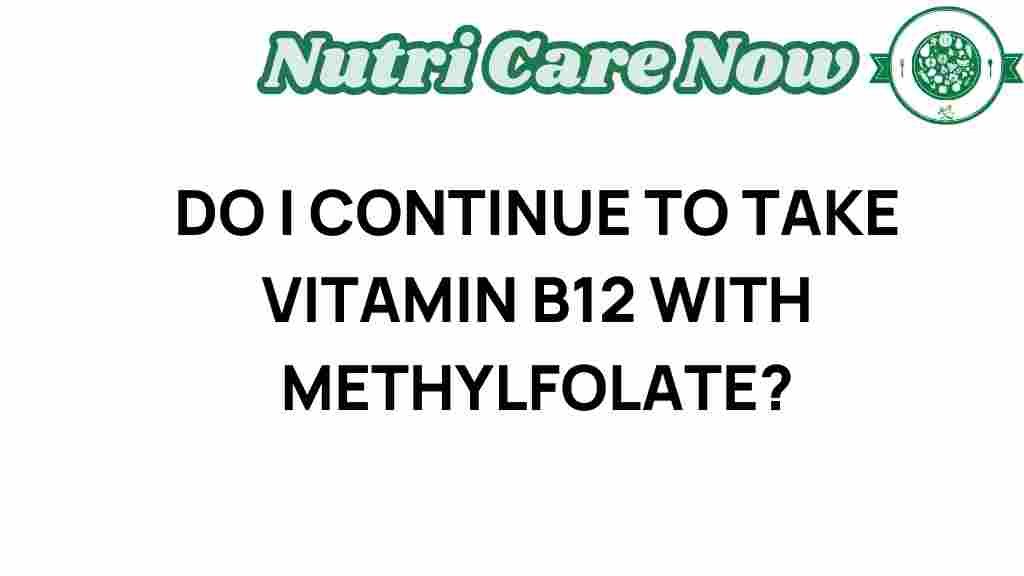The Surprising Connection Between Vitamin B12 and Methylfolate: Should You Keep Taking Them?
In the realms of nutrition and wellness, few topics garner as much attention as vitamins and their impact on overall health. Among these, Vitamin B12 and Methylfolate stand out due to their critical roles in maintaining bodily functions and promoting cognitive health. Understanding the relationship between these two nutrients can lead to informed dietary advice and better health outcomes. In this article, we delve into the connection between Vitamin B12 and Methylfolate, exploring their benefits, how they work together, and whether you should continue taking them as part of your supplement regimen.
Understanding Vitamin B12
Vitamin B12, also known as cobalamin, is a water-soluble vitamin that plays a vital role in various bodily functions. It is essential for:
- Red blood cell formation
- Nerve function
- DNA synthesis
- Energy production
Vitamin B12 is primarily found in animal products such as meat, fish, eggs, and dairy. Individuals following a vegetarian or vegan diet are often at a higher risk of deficiency and may need to consider supplementation.
What is Methylfolate?
Methylfolate is the active form of folate (Vitamin B9) that the body can utilize directly. It is crucial for:
- DNA synthesis and repair
- Amino acid metabolism
- Brain health and function
- Reducing homocysteine levels
Folate is abundant in leafy greens, legumes, and fortified foods. However, many individuals have a genetic mutation (MTHFR mutation) that affects their ability to convert folate into its active form, making Methylfolate supplementation beneficial.
The Connection Between Vitamin B12 and Methylfolate
Vitamin B12 and Methylfolate work synergistically in the body, particularly in the methylation process, which is crucial for numerous biochemical reactions. This process is essential for:
- Producing neurotransmitters
- Regulating gene expression
- Maintaining healthy homocysteine levels
When the body lacks either nutrient, it can lead to various health issues, including cognitive decline, anemia, and other serious conditions. This connection highlights the importance of ensuring adequate levels of both Vitamin B12 and Methylfolate for optimal health.
Health Benefits of Vitamin B12 and Methylfolate
Both Vitamin B12 and Methylfolate offer a range of health benefits that contribute to overall wellness:
1. Enhanced Cognitive Function
Research shows that both Vitamin B12 and Methylfolate are crucial for maintaining cognitive function. They help produce neurotransmitters like serotonin and dopamine, which are vital for mood regulation and mental clarity. Ensuring adequate intake may help reduce the risk of cognitive decline and neurodegenerative diseases.
2. Improved Mood and Mental Health
Vitamin B12 and Methylfolate deficiencies have been linked to depression and anxiety. Supplementation with these vitamins may aid in improving mood and overall mental health.
3. Cardiovascular Health
Both nutrients help regulate homocysteine levels. Elevated homocysteine is a risk factor for cardiovascular disease. By maintaining adequate levels of Vitamin B12 and Methylfolate, you can support heart health.
4. Energy Production
Vitamin B12 is essential for energy metabolism. A deficiency can lead to fatigue and weakness, making it vital for those with low energy levels to consider their intake of this vitamin.
Should You Keep Taking Vitamin B12 and Methylfolate Supplements?
The decision to continue taking Vitamin B12 and Methylfolate supplements depends on several factors:
- Dietary Intake: If you consume a balanced diet rich in animal products and leafy greens, you may be getting sufficient amounts of these vitamins.
- Health Conditions: Certain conditions, such as gastrointestinal disorders, can affect nutrient absorption, making supplementation necessary.
- Age: As you age, your body may become less efficient at absorbing nutrients, increasing the need for supplementation.
- MTHFR Mutation: If you have this genetic mutation, taking Methylfolate may be particularly important for your health.
Step-by-Step Process: Evaluating Your Need for Supplements
If you are unsure whether to continue taking Vitamin B12 and Methylfolate supplements, follow these steps:
1. Assess Your Diet
Take a close look at your daily food intake. Are you consuming enough sources of Vitamin B12 and folate? If you follow a vegetarian or vegan diet, you might need to supplement.
2. Consult a Healthcare Provider
Before making any changes to your supplement regimen, consult with a healthcare professional. They can perform blood tests to determine your levels of these vitamins.
3. Monitor Symptoms
Keep an eye on any symptoms such as fatigue, mood changes, or cognitive issues. These may indicate a deficiency that needs to be addressed.
4. Adjust Your Supplementation
Based on your dietary assessment and healthcare provider’s advice, adjust your supplementation as necessary.
Troubleshooting Tips for Vitamin B12 and Methylfolate Supplementation
If you are experiencing issues with your Vitamin B12 or Methylfolate supplementation, consider the following troubleshooting tips:
- Check Dosage: Ensure you are taking the correct dosage as recommended by your healthcare provider.
- Timing: Some individuals may find taking these supplements with food helps with absorption.
- Form of Supplement: There are various forms of Vitamin B12 (methylcobalamin, cyanocobalamin) and Methylfolate (L-methylfolate). Consult with your provider to find the best form for you.
- Monitor Side Effects: Some people may experience side effects. If you do, consult your healthcare provider for alternatives.
Conclusion
The connection between Vitamin B12 and Methylfolate is significant, especially when it comes to nutrition and overall health. Both nutrients are essential for cognitive function, mood regulation, and cardiovascular health. By understanding their roles and how they work together, you can make informed decisions about your dietary advice and supplementation.
If you suspect a deficiency or are considering starting a new supplement regimen, be sure to consult a healthcare provider to tailor your approach to your unique health needs. In doing so, you can enhance your wellness journey and support your cognitive function effectively.
For more information on vitamins and supplements, visit National Institutes of Health for reliable dietary advice.
Additionally, explore more about nutrition and health benefits of other essential vitamins to enhance your well-being.
This article is in the category Supplements and created by NutriCareNow Team
